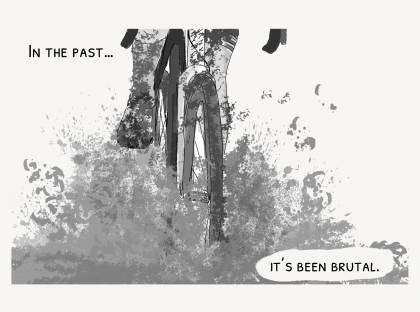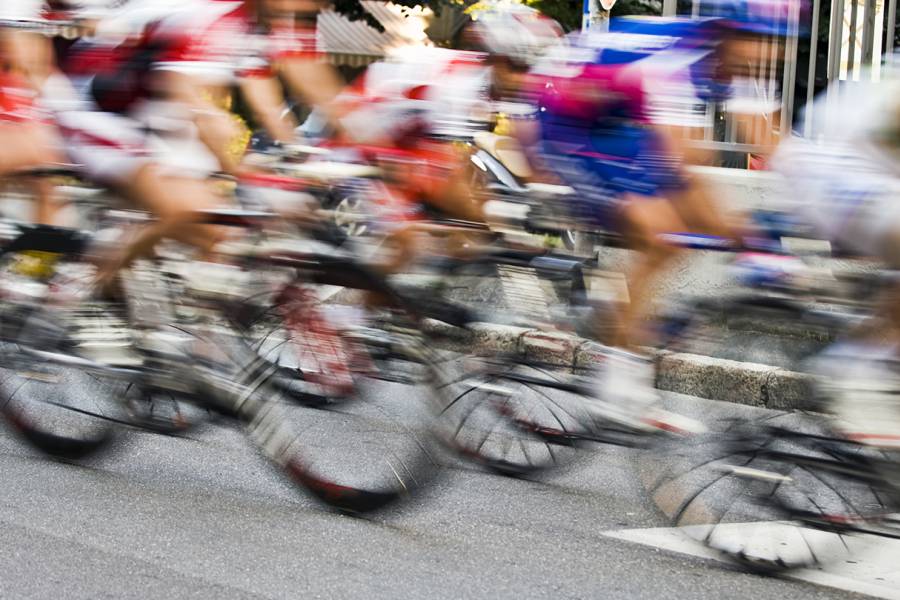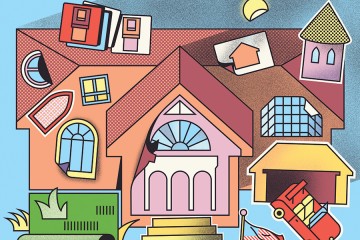Slovenian cyclist Primož Roglič started the penultimate stage of the 2020 Tour de France on the verge of history. A ski jumper who took up cycling in 2012 at the ancient professional athlete age of 23, Roglič had rapidly ascended into the sport's elite. He won the 2019 Vuelta a España, becoming the first Slovenian to win a grand tour. And on Sept. 6, 2020, he became the first Slovenian cyclist to don the yellow jersey worn by the Tour de France's overall leader, a position he held for the next 10 stages. All that stood in his way to victory was a race against the clock.
Riders start individual time trials—the Tour's last stage before the largely ceremonial final-day ride to Paris—at staggered intervals in reverse order of standing. That made Roglič the last cyclist to depart Lure in eastern France on the event's final Saturday for the 22.5-mile ride to a ski station in the Vosges Mountains, a route that concluded with a steep climb.
Tadej Pogačar, Roglič's countryman who was making his Tour debut and trailed by 57 seconds overall, left the starting gate two minutes earlier and became legendary. The 21-year-old finished a full minute and 22 seconds ahead of the field—and nearly two minutes ahead of Roglič—taking the yellow jersey and the Tour itself the next day. In the roughly one hour it took both men to complete the stage, Roglič lost one of cycling's most prestigious events, and Pogačar became the first Slovenian to win the Tour, the youngest winner since 1904, and the first rider to win three different classifications since 1972 when the feat was accomplished by Belgian cyclist Eddy Merckx, widely regarded as one of the sport's gods.

Image caption: The derailleur substack features both writing and illustrations by Kate Wagner on the cycling world.
Roglič's loss crushed The New Republic architecture critic Kate Wagner. "I truly think it had to be one of the worst days ever," says Wagner, a Peabody Institute alum and creator of the hilariously intelligent McMansion Hell blog. She watched the entire three-week Tour unfold from her Chicago apartment during a pandemic year that witnessed her evolution from cycling enthusiast to die-hard fan. "I just watched a man's dreams die on live TV. I remember being in an abject shock and trying not to cry."
She wrote a narrative essay on Medium about the Tour, her first ever cycling piece, which was subsequently picked up by Bicycling magazine and led to more assignments. Last fall, she and cycling writer Jackson Roman launched derailleur, a newsletter in which they ambitiously covered the 2021 Giro d'Italia. She also got tapped to profile Roglič for Bicycling, a fascinating portrait of an athlete and a 6,000-word excursion into the agony and ecstasy of sports fandom.
Now, nine months after writing her first cycling story, Wagner's covering the 2021 Tour de France for ProCycling magazine.
"I didn't hear about final approval until yesterday when I was in the bathroom after taking a bike ride," Wagner says during a Zoom interview in late June. Although she's covered architecture and film festivals, the Tour is an entirely different beast. Imagine the Super Bowl, only it lasts for three weeks and moves across an entire country. "Yes, I will be covering the Tour de France," she says. "I know—truly, no pressure."
The Hub caught up with Wagner prior to her departure to talk about iconic bike frame designs, watching 10 hours of cycling a day, and why we have sports heroes.
How did you first get into cycling and start paying attention to the sport?
I didn't really start watching cycling seriously until last year. I grew up in the least cycling-friendly part of the entire world, the Southern U.S. In college, the Tour de France was like the World Cup, where if you were a cool guy who wore chinos and Joy Division T-shirts you probably watched the Tour de France. It was always on in the summer, like ambient noise.
During the pandemic, I got a time-trial bike, which is the nicest bike I had ever seen in my life. My husband, Stephen, has always been into cycling. His parents biked across the country—lifelong committed amateurs—but they're not really followers of pro cycling. And my in-laws are friends with these rich triathletes, and they gave me a time-trial bike. Every bike I've ever had has been a beater from Craigslist.
The day they gave it to me it was really hot. We were eating a bunch of crabs, drinking beer, and we thought, "Let's go for a bike ride." I was horribly out of shape, and I could barely go three miles before dragging myself back, and I almost puked. It was truly humiliating and I thought to myself, I have to get good at riding a bike in order to justify owning something like this.
When we moved to Chicago, it was the first time I lived anywhere that had bike infrastructure and things to do on a bike—bike trails, bike highways—and even though it's dangerous to bike in Chicago, as it is in a lot of places, I started to slowly get better. I went from not being able to ride three miles to eight miles, and then 20 miles, 50 miles, 60 miles. And then I bought a Bianchi—because it had to be a Bianchi—that had a rear rack on it because you can't haul groceries on a time trial bike.
So, in August I was just like: What if I watched the Tour de France this year? I didn't know going into it that I was going to become an absolute freak about this. I sat down and watched it for five hours every day.
I realized, first of all, that [watching cycling races] is actually just slow TV about architecture and landscapes. Second of all, I grew up watching NASCAR, so I'm used to things that take hours to unfold with lots of little dramas. And the thing about cycling is that it became very apparent to me that there are these broader, strategic machinations that were happening.
It is cool watching decisions get made and attacks form in the peloton.
I think because I started watching full stages and got to see a breakaway form, and the strategy it took to catch the breakaway and things like that, it was truly fascinating to me. Also, there's something viscerally literary about a sport that really encompasses every literary trope—man versus man, man versus machine, man versus nature, man versus nature versus society. The scope of the drama is so huge. You're watching people give all of themselves to something, which is the drama of sports. You are literally watching someone push themselves over hours and kilometers, and massive inhumane climbs, punishing winds, punishing rain. You're seeing someone reach their absolute breaking points. And it feels so intimate and vulnerable to watch it on TV. It feels almost voyeuristic, and kind of a little sick, but at the same time you can't look away.
And in a grand tour like the Tour de France, the stages are long and then there's races within a race, with all the different classifications, where these guys are fighting each other during stages that are kind of like Age of Empires drama, teams doing Machiavellian things on a bike.
Over the course of the grand tour, you hear [the cyclists] in interviews and become emotionally invested. For me at the time, it was all about Primož Roglič. As I learned more and more about Roglič, I was obsessed because his whole story is so fascinating. Also, he was just killing that race. He was so dominant there was a kind of beauty to it. And there's all these different stories in each stage, each breakaway, with so many different arcs, and you can get sucked into it all—on the deeply personal scale of an individual and the grand scale of a three-week race.
How did your interest in cycling turn into writing about cycling?
I started wanting to write about cycling after I read Tim Krabbe's [novel] The Rider. I had started riding bikes more seriously in terms of distance and speed, so I empathized with the visceral feelings of bodily exhaustion. I wanted to write about cycling like that.
I'm always impressed with how deep your knowledge is, not just in race dynamics but cycling's weird traditions and lore. How did you digest cycling's history so quickly?
I woke up at 5 a.m. during cycling season to watch cycling every day. I did it with a group of people on a Discord server, some of whom are also cycling journalists and some of whom are people who have been fans for their whole lives. That's how I met Jackson, who co-writes derailleur with me.
I would watch cycling in the morning and then work as an architecture critic. Then around 5 or 6 in the evening, I would watch old races until midnight. I've made it all the way back through every monument and grand tour since 2011. And I read about 25 books on cycling on my phone before going to bed, or on the train. I basically did the biggest cram session of my life, watching and reading about cycling for 10 hours a day.
How did you and Jackson decide to start derailleur?
Derailleur started because I wanted to do longform cycling writing. I originally wanted it to be sort of like the Recycle podcast that covers old cycling stories. I think once [the 2020 race] Strade Bianche (in central Italy) happened, it was so exciting that I couldn't not write about it. That's when it became a publication covering races.
So you profiled Roglič. How was that?
No one is truly more sick of hearing about this than my husband, but I have repeatedly referred to Roglič as my only hero in life. The thing about Roglič is that 14 days after he lost the Tour de France, he wins the [2020 Liège–Bastogne–Liège] and then the Vuelta [a España].
We look to heroes for things that we struggle with in our own lives, and for me, my biggest struggle is self-discipline. If something goes wrong, it's like the sky is falling and I get despondent. It's like I can't do anything. And the ability to have so much faith in yourself and your ability, and the perspective it takes—I mean, if I lost the Tour de France like that, I would never get on a bike again. I would never look myself in the eye. But not him.
I go through periods where I don't want to do anything. I don't want to get up. But—and this will sound so insipid and childish—I also think, Roglič would get out of bed. It's a motivating thing.
Cycling is truly like that. When I'm on the bike, I have to have the motivation to keep going when there's a 25-mph Chicago headwind. And self-discipline and perseverance, the ability to continue on when the world seems truly terrible, when everything goes terribly wrong and just to be able to keep going—cause that's what we all have. We have to keep going. We have to build a better future for people who are younger than us. We have to persevere in the face of a world where cops shoot civilians in cold blood, and climate change is going to destroy us all.
And to be able to persevere in a world like that I think is truly a testament to human fortitude. And for me, sports offer that because it's so easy to fall into despair.
Sometimes living life feels like being all alone on a mountain about to lose Vuelta. So to witness somebody do that and not lose the Vuelta because you just gave everything, to witness someone triumph over themselves and their adversaries and the terrible world and a terrible mountain, it gives you a kernel of the possible. And for people like my husband and me, who are involved in political organizing, we're looking for that kernel of the possible in the broader grand scheme of things. I think it's why a lot of people watch sports, the celebration of a triumph. In cycling, people love losers as much as winners, which I actually appreciate—again, literary sport.
Is Roglič your favorite going into this year's Tour?
That's not even a question. In the cycling press I'm known as the Roglič guy. To be fair, he is my literary white whale, but yes, obviously him.
I have this theory that during any given period of cycling there is a protagonist, and that's the main character of the era—the [British cyclist Chris] Froome era. Even when Froome wasn't in races, people thought about him and talked about him.
What's so fascinating about our period now is we have so many guys who are equally talented. The competition is slim, so there's not one guy who truly dominates the rest. Simon [Yates] becomes sort of a main character because he's been dominating stage races for three years, but there's not just one guy or one team dominating.
And these characters of cycling are fascinating. You have Tadej Pogačar, who is truly this serene, very level-headed gentle boy who wreaks such misery on so many. He destroys people's lives on the bike. He's truly terrifying. His disposition really does remind me a lot of Eddy Merckx, just that very calm, almost serene soft-spokenness that belies something that is truly sublime underneath.
Given your idea of cycling's main character, I'm curious: What's your take on the Lance Armstrong era? I recall American journalists saying he was going to mar cycling's reputation for a decade, as if doping hasn't always been a part of the sport.
I think the Lance Armstrong thing was really insidious. It wasn't so much that he doped, it was that he facilitated a massive doping arms race that forced anyone—whether they wanted to or not—to do it. The reason why that era and the '90s were so bad wasn't because cyclists doped—as you said, they always had done that—but the blood doping in the '90s killed people. You're truly talking about people reaching incredibly desperate states.

Image caption: A portrait featured in the derailleur substack
Image credit: Kate Wagner
If you watch old videos of [Armstrong] on the Alpe d'Huez, where it looks like he just floats up the mountain effortlessly, that's truly supernatural. It is not pleasant to watch. You get the sick feeling that something is not right because the human body does not do something like that naturally. At least with now, cyclists labor and crack on the mountain. There's no one flying up effortlessly time after time after time. Roglič cracks. Pogačar cracks. They have limits. Did they have extraordinary recovery times? Yes. Is that the same as having superhuman ability to do feats of cycling that no one has ever seen? No.
Also, cycling has become a lot more professionalized over the last 10 years. The Lance Armstrong era was truly the last of the cowboy eras where you had teams built around the individuals. Lance and the Postal Service team really revolutionized cycling in forming things like a train and seizing control of the race, having a bigger team strategy than just who is the strongest guy out of all our guys.
Some people think that a refined approach makes cycling more boring, but I also think it disincentivizes a certain type of desperation because you're working organically as a team, and you're doing these games of brinkmanship and race control. I think that's just as complex as guys duking it out. And in a mountain stage, toward the end, the domestiques can't go anymore, and then it ends up being mano-a-mano on the side of the mountain. And that's still exciting. Guys still crack. They still tire and go backward. And sometimes, somebody's strongest because they have a really good day. Sometimes their team has been the most active in protecting them from the elements and making sure that they have food and water and keeping morale up and things like that.
Finally, earlier you mentioned that you got a Bianchi with a rack for groceries and the like but said it had to be a Bianchi. Why did it have to be a Bianchi?
I had this roommate in graduate school who had this cherry red Bianchi fixed-gear bike, and it was the first time I'd ever looked at a bike and felt, that is so sick. I'd never seen a bike that looks so cool in my life. And he said, that's a Bianchi—if you know, you know. And I had to know.
It's just an iconic piece of Italian design. It's a sexy bike. It's like a Herman Miller chair. It looks fast just sitting there.
Posted in Arts+Culture, Athletics, Alumni









